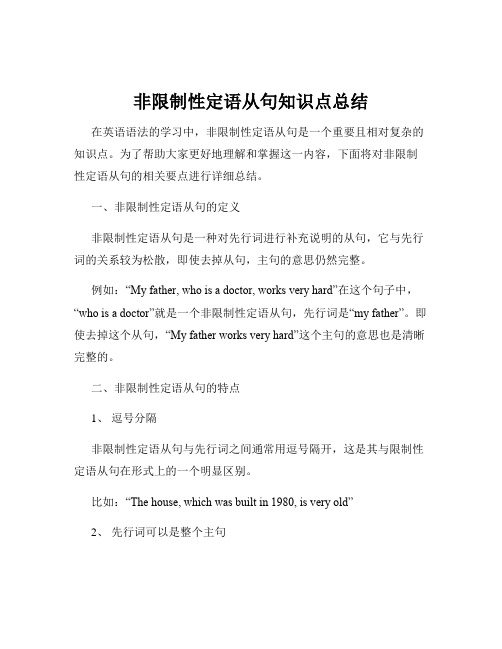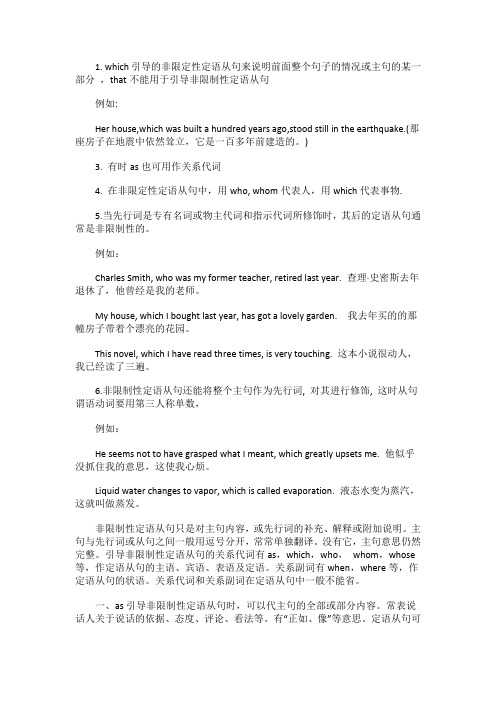非限制性定语从句讲解及8大考点知识讲解
定语从句与非限制性定语从句详解定语从句和非限制性定语从句的区别和用法

定语从句与非限制性定语从句详解定语从句和非限制性定语从句的区别和用法定语从句与非限制性定语从句详解定语从句和非限制性定语从句是英语语法中重要的修饰结构,它们在句子中充当修饰名词的作用。
本文将详细解析定语从句和非限制性定语从句的区别和用法。
一、定语从句定语从句是一个句子,用来修饰一个名词或名词短语,并对其起修饰作用。
定语从句通常由关系代词或关系副词引导,它们在定语从句中担当一定的语法角色。
1. 关系代词引导的定语从句关系代词包括:that, which, who, whom, whose。
关系代词在定语从句中充当主语、宾语、定语或表语的作用。
例如:- The book that I bought is on the table.(我买的那本书在桌子上。
)- The boy who is playing football is my brother.(正在踢足球的男孩是我的弟弟。
)2. 关系副词引导的定语从句关系副词有:where, when, why。
关系副词在定语从句中充当状语的作用,用来修饰先行词。
例如:- The school where I study is very big.(我就读的学校很大。
)- I still remember the day when we first met.(我仍然记得我们第一次见面的那一天。
)定语从句的引导词在从句中不仅起到连接作用,还在从句中担当一定的语法角色。
由于定语从句与主句之间存在一定的语义关系,因此定语从句是限制性的,即它限制了先行词的意义。
二、非限制性定语从句非限制性定语从句是一个句子,用来补充说明先行词的特定信息,而不对先行词的意义进行限制。
非限制性定语从句通常用逗号或破折号与主句隔开,并且往往可以省略。
非限制性定语从句的引导词通常是关系代词和关系副词中的which、who、whom、whose和where、when、why。
与定语从句不同的是,非限制性定语从句在从句中并不充当一定的语法角色。
高中英语2025届高考语法难点非限制性定语从句知识讲解

高考英语语法难点非限制性定语从句一、非限制性定语从句1.非限制性定语从句的构成非限制性定语从句对先行词进行补充说明,去掉不会影响主句的意思,通常用逗号与主句隔开。
先行词可以是主句中的某个名词或名词词组,也可以是主句中的谓语部分,或者是整个主句。
如:My grandmother,who is over eighty years old, still does housework on her own.(先行词为My grandmother)The plane was delayed,which made the passages very angry.(先行词为整个主句The plane was delayed)He sang us a folk song,which he had learned during his stay in the countryside.(先行词为a folk song)Mrs.Zhang is extremely popular amongstudents, as is common knowledge.(先行词为整个主句,从句对主句内容进行评述)2.非限制性定语从句的关系词非限制性定语从句由关系代词which、who、whom、whose或关系副词when、where等引导。
1) who、which引导非限制性定语从句并在从句中作主语。
如:Bob lent me a thousand dollars,which was exactly the amount I need.鲍勃借给我一千美元,正好是我所需要的数目。
The children,who wanted to play football, were disappointed when it rained.想踢足球的孩子们因下雨而感到失望。
The computer,which seems to play the role of a human brain, is often called an electronic brain.计算机似乎起着人脑的作用,所以常被称为电脑。
中考非限制性定语从句讲解

这篇关于中考⾮限制性定语从句讲解,是⽆忧考特地为⼤家整理的,希望对⼤家有所帮助!
在英语中,只说简单句会让你显得语⾔贫乏,是时候学会⽤定语从句丰富你的语⾔了。
⽽定语从句中,有⼀类叫做⾮限制性定语从句。
接下来,我们将为⼤家简单讲解⼀下这类从句的⽤法!
⾮限定性定语从句起补充说明作⽤,缺少也不会影响全句的理解,在⾮限定性定语从句的前⾯往往有逗号隔开,如若将⾮限定性定语从句放在句⼦中间,起前后都需要⽤逗号隔开。
关系带刺有as和which,⽽不是that。
列1:The sun heats the earth , which makes it possible for plants to grow .
太阳给予⼤地热,这就使植物的⽣长成为可能。
(此句中,⾮限定性定语从句是对全句进⾏补充、说明,将全句表达的意思看成"⼀件事情)。
列2:As is reported in the newspaper ,some artistic treasures(艺术珍品) will be on show at the exhibition on the weekend.据报纸报道,这个周末的展会将会展出⼀些艺术珍品。
非限制性定语从句初中语法精讲

非限制性定语从句初中语法精讲非限制性定语从句是一个相对简单但也很重要的语法概念。
在初中英语学习中,理解并正确运用非限制性定语从句能够帮助我们提升语言表达和写作能力。
本文将详细解释什么是非限制性定语从句,如何识别和使用非限制性定语从句,并提供一些有用的例句和练习。
I. 非限制性定语从句的定义非限制性定语从句用于对主句中的某个名词或代词进行进一步的解释或补充。
它可以提供附加信息,但并不对主句的意义产生限制。
非限制性定语从句通常用逗号或者括号将其与主句隔开,从而与主句相对独立。
II. 非限制性定语从句的特点1. 非限制性定语从句一般由关系词“who”,“which”,“whom”引导,并与先行词有关。
例如:- My brother, who is a doctor, lives in New York.(我弟弟是医生,住在纽约。
)- This novel, which was written by a famous author, is very popular.(这本小说是由一位著名作家写的,非常受欢迎。
)2. 非限制性定语从句的引导词既可以作为主语,也可以作为宾语。
例如:- John, who is my best friend, called me yesterday.(约翰,我的好朋友,昨天给我打电话了。
)- I have a dog, which I love very much.(我有一只狗,我非常爱它。
)3. 非限制性定语从句一般只用逗号与主句隔开,但在口语中也可以使用括号。
例如:- The movie, which was released last week, was a big hit.(上周上映的这部电影非常受欢迎。
)- My neighbor (who is a famous singer) often practices singing at home.(我邻居,他是一位著名歌手,经常在家里练歌。
非限制性定语从句知识点总结

非限制性定语从句知识点总结在英语语法的学习中,非限制性定语从句是一个重要且相对复杂的知识点。
为了帮助大家更好地理解和掌握这一内容,下面将对非限制性定语从句的相关要点进行详细总结。
一、非限制性定语从句的定义非限制性定语从句是一种对先行词进行补充说明的从句,它与先行词的关系较为松散,即使去掉从句,主句的意思仍然完整。
例如:“My father, who is a doctor, works very hard”在这个句子中,“who is a doctor”就是一个非限制性定语从句,先行词是“my father”。
即使去掉这个从句,“My father works very hard”这个主句的意思也是清晰完整的。
二、非限制性定语从句的特点1、逗号分隔非限制性定语从句与先行词之间通常用逗号隔开,这是其与限制性定语从句在形式上的一个明显区别。
比如:“The house, which was built in 1980, is very old”2、先行词可以是整个主句非限制性定语从句的先行词不仅可以是一个名词或代词,还可以是整个主句。
例如:“He failed the exam, which made his parents very disappointed” 这里先行词就是“He failed the exam”整个句子。
3、关系词的使用(1)关系代词:which、who、whom、whose 等。
which 指代物,在从句中可作主语、宾语等。
who 指代人,在从句中作主语。
whom 指代人,在从句中作宾语。
whose 表示“……的”,在从句中作定语。
(2)关系副词:when、where 等。
when 指代时间,在从句中作时间状语。
where 指代地点,在从句中作地点状语。
需要注意的是,非限制性定语从句中不能使用 that 作为关系词。
三、非限制性定语从句中关系词的具体用法1、 which 的用法(1)which 可以指代主句中的某个名词,也可以指代整个主句。
小学英语非限定性定语从句语法讲解

1. which引导的非限定性定语从句来说明前面整个句子的情况或主句的某一部分,that不能用于引导非限制性定语从句例如:Her house,which was built a hundred years ago,stood still in the earthquake.(那座房子在地震中依然耸立,它是一百多年前建造的。
)3. 有时as也可用作关系代词4. 在非限定性定语从句中,用who, whom代表人,用which代表事物.5.当先行词是专有名词或物主代词和指示代词所修饰时,其后的定语从句通常是非限制性的。
例如:Charles Smith, who was my former teacher, retired last year. 查理·史密斯去年退休了,他曾经是我的老师。
My house, which I bought last year, has got a lovely garden.我去年买的的那幢房子带着个漂亮的花园。
This novel, which I have read three times, is very touching. 这本小说很动人,我已经读了三遍。
6.非限制性定语从句还能将整个主句作为先行词, 对其进行修饰, 这时从句谓语动词要用第三人称单数,例如:He seems not to have grasped what I meant, which greatly upsets me. 他似乎没抓住我的意思,这使我心烦。
Liquid water changes to vapor, which is called evaporation. 液态水变为蒸汽,这就叫做蒸发。
非限制性定语从句只是对主句内容,或先行词的补充、解释或附加说明。
主句与先行词或从句之间一般用逗号分开,常常单独翻译。
没有它,主句意思仍然完整。
引导非限制性定语从句的关系代词有as,which,who,whom,whose 等,作定语从句的主语、宾语、表语及定语。
非限制性定语从句知识点总结
非限制性定语从句知识点总结非限制性定语从句是英语语法中的一种重要句子结构,用来修饰主句中的名词或代词,进一步说明其前面的名词或代词的特点、性质、状态等。
相对于限制性定语从句,非限制性定语从句在语法结构和用法方面略有不同。
本文将对非限制性定语从句的使用、结构和注意事项进行总结。
一、非限制性定语从句的使用场景非限制性定语从句通常用来对主句中的名词或代词进行补充说明,起到进一步修饰的作用。
非限制性定语从句并不是主句中名词或代词的必需部分,即使去掉非限制性定语从句,主句的意思仍然完整。
例如:1. My friend, who is a doctor, is coming to visit me tomorrow.(我的朋友,他是一名医生,明天要来看我。
)2. The Taj Mahal, which is located in India, is a world-famous tourist attraction.(泰姬陵,位于印度的一座世界著名旅游景点。
)二、非限制性定语从句的基本结构非限制性定语从句通常由关系代词或关系副词引导,引导词可用于引导主语、宾语、表语等不同的成分。
关系代词引导非限制性定语从句的常见单词有:who, whom, whose, which, that;关系副词引导非限制性定语从句的常见单词有:when, where, why。
例如:1. My brother, who is a teacher, lives in London.(我的弟弟,他是一名教师,住在伦敦。
)2. I visited the school where my mother used to study.(我参观了我母亲曾经就读的学校。
)三、非限制性定语从句的注意事项1. 非限制性定语从句和主句之间用逗号或句号隔开,逗号用于较短的非限制性定语从句,句号用于较长的非限制性定语从句。
2. 非限制性定语从句中的谓语动词可以有主谓一致的变化,而限制性定语从句中的谓语动词是不可省略的。
非限制性定语从句的八类考点
非限制性定语从句的八类考点考点一考查非限制性定语从句的基本用法非限制性定语从句的基本用法指的是定语从句由关系代词或关系副词引导,通常置于主句之后,但有时也置于主句中间或主句之前(仅限于as引导的定语从句)。
如:His best movie, which won several awards, was about the life of Gandhi. 他的最佳影片,就是荣获几项奖的那部,是关于甘地生平的。
The train, which takes only two hours to get there, is quicker than the bus, which takes three. 坐火车去那儿要比坐汽车快,坐火车只要2小时,而坐汽车要3小时。
Anyway, that evening, which I’ll tell you more about later, I ended up staying at Rachel’s place. 不管怎样,那个晚上我最后待在了雷切尔那里,我以后会告诉你更多那晚的情况。
The house, which was completed in 1856, was famous for its huge marble staircase. 这座房子建于1856年,以巨大的大理石楼梯闻名。
People threw coins onto the stage, as was the custom. 人们向舞台上扔钱币,这是他们的习俗。
【真题再现】(答案为CA)1. It is the third time that she has won the race, ______ has surprised us all. (2012陕西卷)A.thatB.whereC.whichD. what2. By 16:30, ______ was almost closing time, nearly all the paintings had been sold. (2012江西卷)A.whichB.whenC.whatD. that考点二考查分离型非限制性定语从句所谓分离型非限制性定语从句,指的是引导非限制性定语从句的关系词与它所引导的定语从句被其他一些词语(如插入语等)隔开,从而造成关系词与定语从句的分离。
非限制性定语从句的讲解
非限制性定语从句的讲解在英语语法中,定语从句是一种修饰名词的句子,用来对名词进行详细说明或限定。
非限制性定语从句是其中的一种形式,相较于限制性定语从句,非限制性定语从句提供了一些额外的信息,但并非对名词进行必要的限定。
非限制性定语从句通常用逗号来与主句进行分隔,使其更加突出但并不影响主句的意思。
在语法结构上,非限制性定语从句通常由关系代词或关系副词引导,从而与主句进行连接。
在使用时,我们可以根据具体情况选择合适的关系代词或关系副词来引导定语从句,以达到表达清晰、语句通顺的效果。
一个典型的例子是:The book, which was written by a famous author, has become a bestseller.在这个例句中,非限制性定语从句“which was written by a famous author”通过逗号与主句分隔开来,提供了关于书籍作者的额外信息,但并不改变主句的意思。
需要注意的是,在非限制性定语从句中,关系代词通常用于指代事物,而关系副词则用于指代时间、地点或原因等情况。
正确使用关系代词或关系副词是构建清晰、准确语句的重要一环。
除了关系代词和关系副词,非限制性定语从句中还有一点需要注意的是,定语从句的主谓一致原则。
即非限制性定语从句的主语和谓语在人称和数上必须与主句中的名词保持一致,这样才能确保句子结构完整、语意清晰。
总的来说,非限制性定语从句在英语语法中扮演着重要角色,能够为句子提供更为详细、生动的描述,丰富句子表达的层次和信息。
正确运用非限制性定语从句,可以使文章更具丰富性和可读性,是提高英语写作能力的重要技巧之一。
愿以上内容能够对你的学习有所帮助。
非限定性定语从句知识点
非限定性定语从句知识点非限定性定语从句知识点在学习中,大家都背过不少知识点,肯定对知识点非常熟悉吧!知识点也可以理解为考试时会涉及到的知识,也就是大纲的分支。
哪些才是我们真正需要的知识点呢?以下是店铺收集整理的非限定性定语从句知识点,供大家参考借鉴,希望可以帮助到有需要的朋友。
非限定性定语从句:非限定性定语从句的作用是对所修饰的成分作进一步说明,通常和主句间用逗号隔开,将从句拿掉后其他部分仍可成立1. which引导的非限定性定语从句来说明前面整个句子的情况或主句的某一部分2. 在引导限定性定语从句时,that有时相当于in which, at which, for which或at whichAttitudes towards daydreaming are changing in much the same way that(in which) attitudes towards night dreaming have changed. 人们对白日做梦的态度正在改变,这与人们对夜间做梦的看法的变化有非常相似之处。
I like the music for the very reason that(for which) he dislike it. 我出于某种原因喜欢这种音乐,而他恰恰与我相反。
We arrived the day that(on which) they left. 刚好我们到的那天他们走了。
3. 有时as也可用作关系代词4. 在非限定性定语从句中,不能用that,而用who, whom代表人,用which代表事物拓展:非限定性定语从句的用法1.非限定性定语从句对先行词的修饰限定A.I have a dream that I want to make fortunes and own a house, which has a verdant lawn.我有个梦想,就是赚钱,并拥有一座别墅,它带有绿茵草坪。
- 1、下载文档前请自行甄别文档内容的完整性,平台不提供额外的编辑、内容补充、找答案等附加服务。
- 2、"仅部分预览"的文档,不可在线预览部分如存在完整性等问题,可反馈申请退款(可完整预览的文档不适用该条件!)。
- 3、如文档侵犯您的权益,请联系客服反馈,我们会尽快为您处理(人工客服工作时间:9:00-18:30)。
非限制性定语从句非限制性定语从句也是定语从句的一种,在高中语法知识中它也是非常重要的一项的,老师们对于非限定性定语从句的讲解也是非常重视的。
因为在考试中经常会出现该从句的讲解,下面大家就跟随小编一起来了解该从句的讲解。
说到非限定性定语从句的讲解,还要分成不同的部分,首先大家要知道就得就是该从句的作用是什么。
其实它在句子中是一个独立的成分,不会受到主句的限制,把从句去掉之后,主句仍然是成立的。
这也是为什么它会叫做非限定性定语从句。
其次,大家要了解该从句的形式:非限制性定语从句与先行词以及主句之间的关系不甚紧密,因而通常要用逗号与主句分隔开。
例如:Have you seen the film Titanic, whose leading actor is world famous?你看过“泰坦尼克号”这部电影吗?它的男主演可是世界闻名的。
My friend, who has served on the International Olympic Committee all his life, is retiring next month.我有位朋友,他一辈子服务于国际奥林匹克委员会,下个月就要退休了。
在非限制性定语从句也分成不同的种类,在不同情况下,该从句的使用方法也是不一样的,在考试中经常会考察大家对于该从句不同类型的运用。
如果大家不能很好的掌握这些用法,在考试的时候就一定会丢分了,下面就是关于该从句不同类型的介绍:(1) who引导的非限制性定语从句Our guide,who was a French Canadian,was an excellent cook.我们的向导,一个法裔加拿大人,擅长于烹调。
My gardener,who is very pessimistic,says that there will be no apples this year.我家的园丁非常悲观,他说今年将不结苹果。
(2) whom引导的非限制性定语从句关系代词whom用于指人,在句中作动词宾语和介词宾语,作介词宾语时,介词可位于句末。
如:Peter, whom you met in London, is now back in Paris.彼得现在回巴黎了,你在伦敦见过他。
Mr Smith,from whom I have learned a lot,is a famous scientist.史密斯先生是一位著名的科学家,我从他那儿学了许多东西。
(3) whose引导的非限制性定语从句whose是关系代词who的所有格形式,在从句中作定语。
whose通常指人,也可指动物或无生命的事物。
如:The boy, whose father is an engineer, studies very hard.那位小男孩学习很努力,他的父亲是位工程师。
Above the trees are the mountains whose magnificence the river faithfully reflects on the surface. 在树林的高处是山,其壮丽的景色完全映照在河面上。
The play,whose style is rigidly formal,is typical of the period.这剧本是那个时期的典型作品,风格拘谨刻板。
(4) which引导的非限制性定语从句关系代词which在非限制性定语从句中所指代和修饰的可以是主句中的名词、形容词、短语、其他从句或整个主句,在从句中作主语、动词宾语、介词宾语或表语。
① which指代主句中的名词,被指代的名词包括表示物、婴儿或动物的名词、表示单数意义的集体名词以及表示职业、品格等的名词。
如:These apple trees,which I planted three years ago,have not borne any fruit.这些苹果树是我三年前栽的,还没有结过果实。
She is an artist,which I am not.她是一位艺术家,而我不是。
Water,which is a clear liquid,has many uses.水是一种清澈的液体,有许多用途。
The two policemen were completely trusted,which in fact they were.那两个警察完全受到信任,事实上,也真是如此。
② which指代主句中的形容词。
如:She was very patient towards the children,which her husband seldom was.她对孩子们很耐心,她丈夫却很少这样。
She is always careless,which we should not be. 她总是马虎大意,我们可不应该这样。
③ which指代主句中的某个从句。
如:He said that he had never seen her before,which was not true.他说以前从没见过她,这不是真的。
④ which指代整个主句。
如:In the presence of so many people he was little tense, which was understandable.在那么多人面前他有点紧张,这是可以理解的。
He may have acute appendicitis,in which case he will have to be operated on.他可能得了急性盲肠炎,如果是这样,他就得动手术。
When deeply absorbed in work,which he often was,he would forget all about eating and sleeping. 他经常聚精会神地工作,这时他会废寝忘食。
(5) when引导的非限制性定语从句关系副词when在非限制性定语从句中作时间状语,指代主句中表示时间的词语。
如:He will put off the picnic until May 1st, when he will be free.他将把郊游推迟到5月1号,那时他将有空。
(6) where引导的非限制性定语从句关系副词where在非限制性定语从句中作地点状语,指代主句中表示地点的词语。
如:They went to London,where they lived for six months.他们去了伦敦,在那儿呆了六个月的时间。
They reached there yesterday, where a negotiation of sale will be held.他们昨天抵达那里, 有一个关于销售的谈判在那儿举行。
(7) as引导的非限制性定语从句as引出非限定性定语从句时,代替整个主句,对其进行说明但通常用于像as we allaknow, as it is know, as is know to all, as it is, as is said above, as always mentioned above, as is usual, as is often the case, as is reported in the newspaper等句式中。
as在非限定性定语从句中作主语、表语或宾语,且引出的从句位置比较灵活,可位于句首或句末,也可置于主句中间。
通常均由逗号将其与主句隔开。
as有“正如……,就像……”之意。
如:As it known to the United States, Mark Twain is a great American writer.美国人都知道,马克?吐温是一位伟大的美国作家。
(as在从句中作主语)He forgot to bring his pen with him, as was often the case. 他忘了带笔,这是常事。
(as在从句中作主语)He is absorbed in work, as he often was. 他正在全神贯注地工作,他过去经常这样。
(as在从句中作表语)Boy as he was,he was chosen king. 他虽是孩子,却被选为国王。
(as在从句中作表语)as we all know, the earth is round.众所周知,地球是圆的。
(as在从句中作宾语) The two brothers were satisfied with this decision,as was agreed beforehand.两兄弟对此决定都满意,这项决定在事前都已得到他们的同意。
(as在从句中作主语) Taiwan is,as you know,an inseparable part of China.你知道,台湾是中国不可分割的一部分。
(as在从句中作宾语)(8)“介词+关系代词”引导的非限制性定语从句在介词后引导非限制性定语从句。
关系代词which有时并不代表主句中某一确定的词,而是概括整个主句的意思。
介词的选择取决于它与先行词的搭配或与从句中谓语动词的搭配。
They were short of sticks to make frames for the climbing vines,without which the yield would be halved. 他们缺搭葡萄架的杆儿,没有它们产量会减少一半。
They thanked Tom,without whose support they would not have succeeded.这些邻居是北京来的,昨天我被介绍同他们认识了。
(9)“名词/代词+of+which / whom”引导的非限制性定语从句It now has 20,000 hectares of land,more than two-thirds of which are under cultivation. 现在它拥有两万公顷土地,其中三分之二之多已经耕种。
Light is the fast thing in the world, the speed of which is 300.000 kilometeThere are 30 chairs in the small hall, most of which are new.大厅里有三十把椅子,绝大部分是新的。
he textile mill has over 8,000 workers and staff,eighty per cent of whom are women. 这家纺织厂有8千多职工,女职工占百分之八十。
